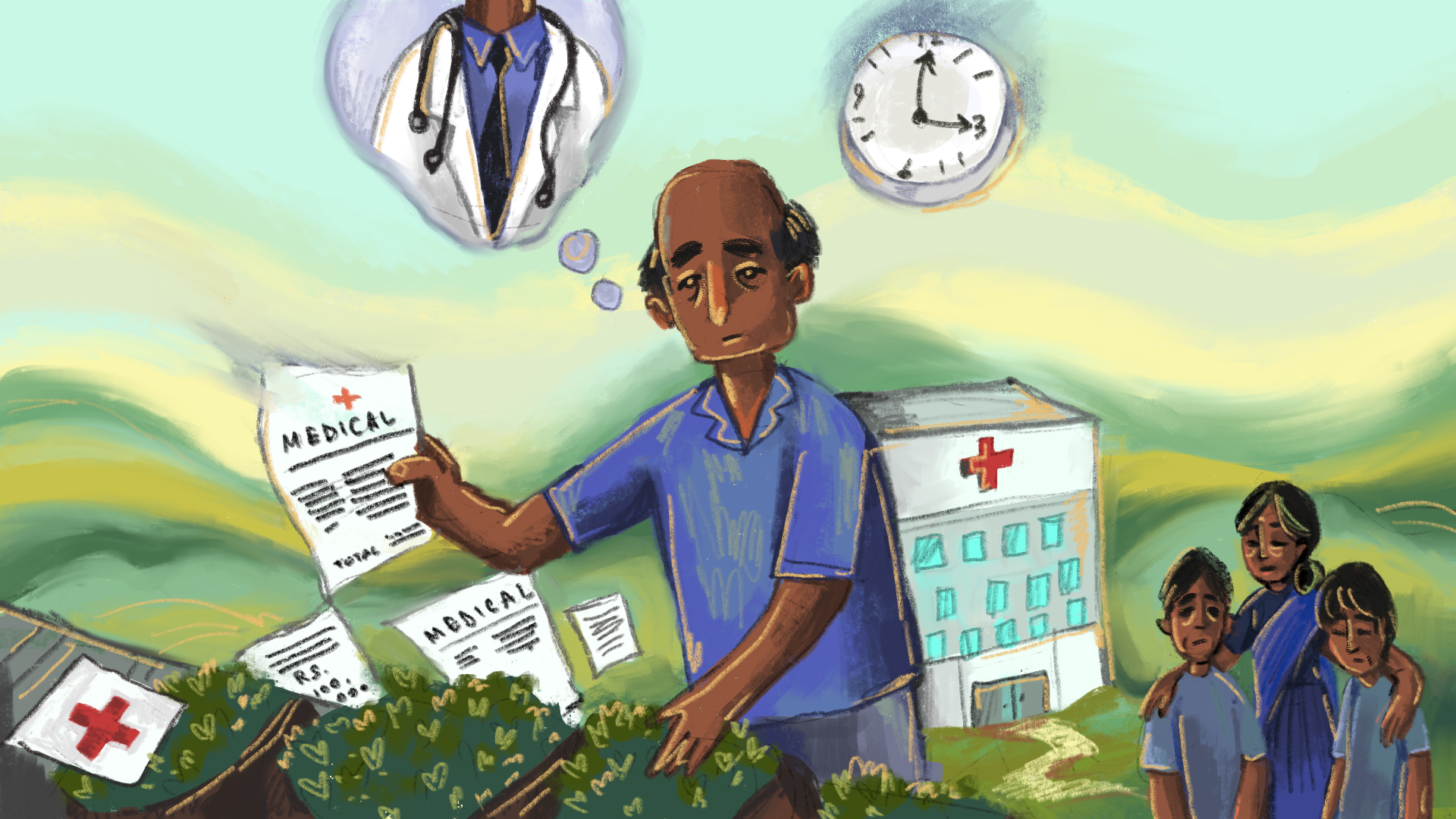An estate worker’s fight for his children’s well-being
Healthcare Inequalities in Nuwara Eliya
August 31, 2023

In Lower Pundaluoya of Sheen Paranawatte, Nuwara Eliya, 43-year-old Nanda Kumara, husband and father of three, faces immense challenges in providing appropriate healthcare for his two severely handicapped children. The story of Nanda and his family sheds light on the pressing issues of access to equitable and affordable medicine and care in marginalised, underprivileged communities.
Having worked as a factory worker in the Sheen Tea Estate for a decade, Kumara struggles to sustain his family with his income. However, the clock is ticking, as he can only continue working at the factory until he is 55 years old; the uncertainty of what lies after that weighs heavily on Kumara’s mind.
Kumara’s two older children—17 and 12—suffer from severe disabilities, rendering them unable to communicate appropriately. The eldest child battles extreme epilepsy, while the younger one struggles to make progress in walking and speaking. The family’s limited financial resources have made it difficult for them to access specialised care and therapy that could improve the quality of life for their children.
Reflecting on his past, Kumara once aspired to become an engineer or doctor, driven by his passion for math and science. However, financial constraints forced him to leave school in the eighth grade and begin working in a shop at the age of 15. Motivated by his desire to be closer to his firstborn, Kumara eventually transitioned to working on the Sheen Tea Estate, where the family resides in a house that was provided by the factory when his grandfather used to work on the same estate.
As the sole breadwinners, Kumara and his wife rely entirely on their jobs at the estate for their income, with no additional sources of support. The family’s financial struggles have been further exacerbated by external crises. During the Easter attacks of 2019, the predominance of Muslim-owned businesses in the area forced temporary closures, making it difficult for the family to purchase essential items.
The COVID-19 pandemic imposed its own set of hardships on the family, including school closures and reduced work hours. Kumara, whose shifts were primarily at night, experienced a significant reduction in income (almost one-third of what he used to previously earn) as his work hours were limited to 3–5 hours per day, as opposed to 8 hours for 4–5 days pre-pandemic. The decrease, combined with the loss of sick leave benefits, intensified the family’s financial strain. Now, after the pandemic, Kumara takes home just Rs. 1,000 for a full, eight-hour shift.
Transportation costs, exacerbated by the ongoing poly-crisis from 2022, add to the family’s burden. Kumara’s youngest child requires Rs. 50 daily to go to school, while monthly hospital visits for the two older children cost the family approximately Rs. 5,000–6,000 by a three-wheeler. The family often avoids using public buses due to the stress it causes the children, but when finances are tight, they reluctantly resort to this option.
Despite their hardships, Kumara and his family choose not to rely on government loans or seek external assistance. Driven by a desire for independence, they make do with their limited income. The family’s meagre monthly allowance of Rs. 400 was obtained for the children’s medicinal expenses only after their proactive inquiry and request to the Grama Sevaka.
Nanda Kumara’s greatest longing is for his children to lead happy and fulfilling lives, envisioning a world where everyone can enjoy equal opportunities and contentment. However, the challenges he faces in accessing resources for his children are a stressful burden to carry, leaving him deeply concerned and worried for their futures.
His story is a poignant reminder of the systemic issues surrounding access to healthcare for marginalised communities. It highlights the urgent need for increased support and resources to ensure that families like Kumara’s can provide their children with the care, treatment and dignity they require. As we strive for a more equitable society, the need to address these disparities becomes even more imperative—it stays as a constant reminder and reflection as to where we currently are, and where we should aim to be.
*Names have been changed to protect the identity of the individual. This interview was conducted in June 2023 and the individual was a respondent of the National Citizen Survey 2022-3.

 Locations
Locations